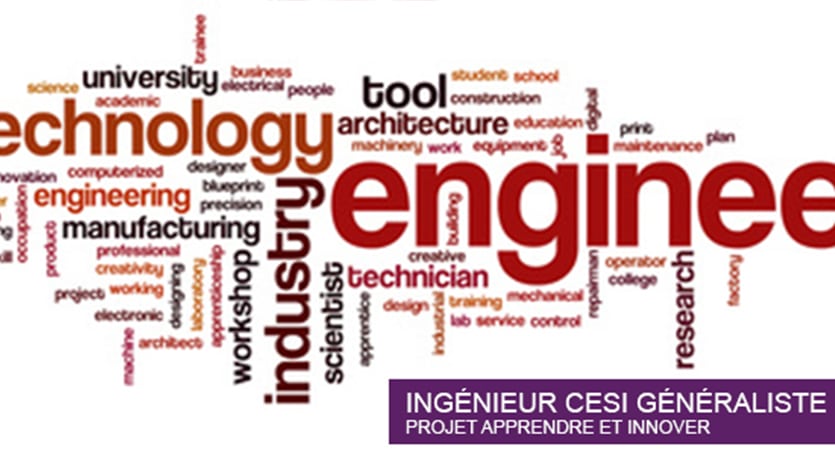Studying CESI’s Engineer competencies development

Start of project : November 2006
End of project: December 2010
The Direction of CESI Ecole d’ingénieurs initiated this research programme to answer a question raised by the Accreditation Board (Commission du Titre d’ingénieurs): what are the competencies really developed through CESI’s curricula in Engineering?
Are they those that are presented in the Diploma Reference Document?
Presentation
A preliminary phase allows to define the notion of « competency » as a set of three dynamics which take place at three different levels, the level of the subject, the level of the group and the level of the organisation.
Two other phases followed.
Year 2007 was dedicated to a transversal study, on all the classes of the General Engineering stream in the Ile-de-France Centre. About fifty students from 2 curricula (apprenticeship and Continuous Training) contributed to the research.
From 2007 to 2010, the research was longitudinal, an consisted in following up a cohort of 50 students from the Paris Centre all along its training (start: November 2007 – end: October 2010). In parallel to this work, a dozen of students in Engineering in Final Year from another class in another centre were interviewed, in order to verify if the proposed model was applicable. It was the case.
Main results
It appeared that CESI’s curricula could be read as an “identity offer”, allowing to move “from a technician to an engineer”, through a set of trials to pass all along the curriculum. These trials are programmed to open the mind, acquire a scientific approach, acquire autonomy, master project monitoring and finally, master the mission of an engineer.
It also appeared a tight link between socialisation process, identity transformation, and competencies development.
The results are a general map of the competencies acquired at the end of the curriculum by CESI Engineer, and a schema of the main steps of their development all along the curriculum.
Publications
BLANDIN, B. GUILLOT, M.N. OUARRAK, B. PALLADO, G. WIART, C. (2007) Socialisation et développement des compétences de l’élève ingénieur, in Colloque « Compétences et socialisation », 7 et 8 septembre 2007 à Montpellier.
PALLADO, G. (2007) La pédagogie du projet dans les dispositifs de formation d’ingénieurs généralistes CESI. Mémoire de Master 2 sciences de l’Education. Nanterre : Université Paris – X
POINTEL-WIART, C. (2007) La dynamique du développement des compétences de l’ingénieur généraliste CESI à travers la notion de « moment clé ». Mémoire de Master 2 sciences de l’Education. Nanterre : Université Paris – X
BLANDIN, B. (2008) Un dispositif conçu comme offre identitaire ? Le cas des formations d’ingénieurs généralistes Cesi, in Actes du 5e colloque Questions de pédagogie dans l’enseignement supérieur, Brest : Telecom Bretagne, p. 623-628
BLANDIN, B. (2010) La compétence de l’ingénieur et sa construction : une tentative de modélisation. Paris : CESI. Texte pour le 20eanniversaire de la formation d’ingénieurs par l’apprentissage.
BLANDIN, B. (2011) Professionnalisation des ingénieurs : quelques réflexions à partir de nos travaux de recherche sur l’apprentissage, in Actes du VIe colloque Questions de pédagogie dans l’enseignement supérieur. Les courants de la professionnalisation : enjeux, attentes, changements, organisé par l’ISSBA à l’Université d’Angers (France) du 8 au 10 juin 2011, p. 663-673.
BLANDIN, B. (2012) The Competence of an Engineer and How it is Built through an Apprenticeship Program: a Tentative Model, in The International Journal of Engineering Education, vol. 28 n°1, p. 57-71.
BLANDIN, B. (2012) Apprentissage, développement et construction de l’identité professionnelle : quelques résultats d’une recherche sur une formation d’ingénieurs en alternance, in Actes de la deuxième conférence internationale de didactique professionnelle « Apprentissage et développement », Atelier 11, Nantes, 7-8 juin 2012 [en ligne] (Atelier 11)